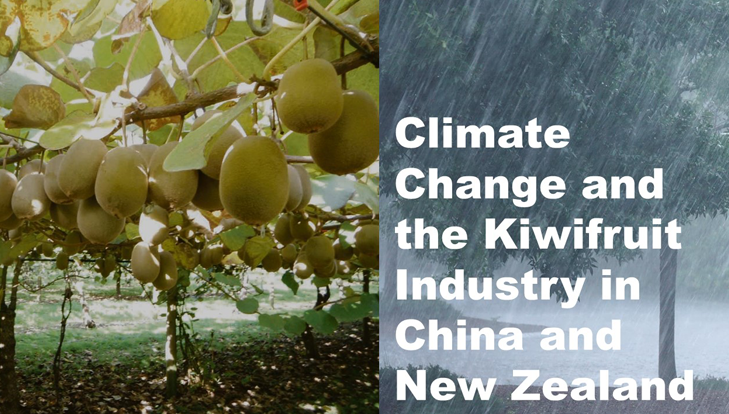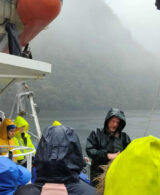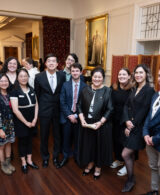Winds of Change: Climate Change and the Kiwifruit Industry in China and New Zealand

This podcast is part of a project of our 2023 North Asia Winds of Change programme.
Group 5: Yani Wu, Paige Lin, Danyang Zhang, Alvin Yueting Li, Matthew Lambie, and Waji Adhihetty
Mentors: Nathalie Wierdak and Prof Wei Gao, ONZM
China Podcast with Associate Professor Lan Jianbing
About the Guest
Assoc. Prof. Lan Jianbing holds the position of Associate Professor and serves as a Masters thesis advisor. He is a member of the Kiwifruit Branch of the Chinese Society for Horticultural Science and holds the directorship of the Grape Branch within the Chinese Society of Agricultural Sciences. Acknowledged as a talent in the Three Zones of Sichuan Province and designated a national technology envoy, his expertise is highly regarded.
His research is primarily centred on addressing pivotal challenges hindering the development of agricultural industries in the southwestern region of China, particularly in the realms of grape and kiwifruit. His work encompasses:
- The collection and utilization of rootstock germplasm resources
- Research on the physiological and molecular biology of protected cultivation under adverse conditions
- The development of rain-shelter facilities aimed at controlling major diseases and associated technologies.
Relevant research projects connected to his work include the Chongqing High-Efficiency Rain-Shelter Cultivation Key Technology Research and Demonstration for Kiwifruit, as well as the Integration of Key Technologies in Modern Facility Agriculture and Industrial Demonstration in Chongqing.
About the Podcast
The podcast focuses on the kiwifruit industry and flooding, connecting disaster management strategies in China and the New Zealand agricultural response to climate change. The podcast involved an in-depth investigation into the scale and distribution of kiwifruit cultivation in China, complemented by interviews with Chinese kiwifruit experts. Our intention is to raise awareness among Chinese and New Zealand agricultural practitioners, researchers, and climate change advocates.
Listeners will gain insights into the distribution patterns of the kiwifruit industry in China and the climatic factors influencing its geographic spread. Associate Professor Lan delves into the issue of diseases affecting kiwifruit due to flooding. He highlights the impact of extreme weather events in China over recent years which have presented challenges and difficulties for kiwifruit cultivation. Crucially, the podcast provides information on proactive measures and management strategies implemented by Chinese growers, government entities, agricultural agencies, meteorological departments, and insurance providers to mitigate the damage caused by floods to the kiwifruit industry.
The overarching goal of this podcast is to foster agricultural appreciation and collaboration between China and New Zealand, encouraging joint efforts to address the challenges posed by climate change.
Listen to the podcast with Associate Professor Lan Jianbing (mp3)
New Zealand Podcast with Dr Gavin Kenny
About the Guest
Dr Gavin Kenny has worked professionally on climate change for over thirty years. During that time, he has focused on climate change impacts, vulnerability, adaptation, and resilience. Dr Kenny has extensive experience with project management, multi-disciplinary research, grassroots engagement, and climate change communication. In his career, he aims to bridge science, policy, and practical action.
Dr Gavin Kenny has a PhD in agricultural meteorology from Lincoln University. Following his studies, he has worked as a researcher for the University of Birmingham, University of Oxford, and University of Waikato. He is the Director of Earthwise Consulting, focusing on climate resilience in over 22 countries.
The kiwifruit industry is prominent in both New Zealand and China. Both kiwifruit industries are facing challenges surrounding climate change. Dr Gavin Kenny has published a paper for the Ministry of Primary Industries called “Adapting to climate change in the kiwifruit industry”.
About the Podcast
In this podcast, you will hear an interview with a leading kiwifruit industry figure in Aotearoa New Zealand, Dr Gavin Kenny, who is the author of a seminal report that examined how the kiwifruit industry in New Zealand should be approaching the question of climate change adaption. As well as speaking specifically to how managing the impacts of climate change should be approached within the industry, he also touches on a key theme which the Winds of Change programme seeks to address, namely science communication. In a career that has spanned over 30 years in the industry, Dr Kenny said there has been significant progress in the public’s awareness of climate change, but the communication of the science behind how we respond to it is still lacking. He mentions the example of how the recent devastating event of Cyclone Gabrielle provoked discussion on resilience of communities, many of whom didn’t fully grasp what that mean due to the fact the concept had not been effectively communicated in previous years.
Dr Kenny also covers how he has seen a change in how the kiwifruit industry looks at its approach to adapting to the impacts of climate change. He talks about how the initial work on approaching climate change adaptation was driven by the government, but now you see the kiwifruit industry itself in New Zealand developing its own adaption plans. With most of the discussion around the impact of climate change in the industry focusing disproportionately on mitigation, as opposed to adaptation, Dr Kenny sees a clear need of a synergistic approach to both adaptation and mitigation within the context of a sustainable environment.
Dr Kenny’s concluding remarks focus on the need for coordinated regional approaches to climate change, as approaching it within the bounds of single industries and geographic areas will not be sufficient. Dr Kenny regards that as an issue that is common not just to New Zealand, but to many areas around the world, including China where he has firsthand experience, emphasising that the need for a better integrated approach is a global issue.







